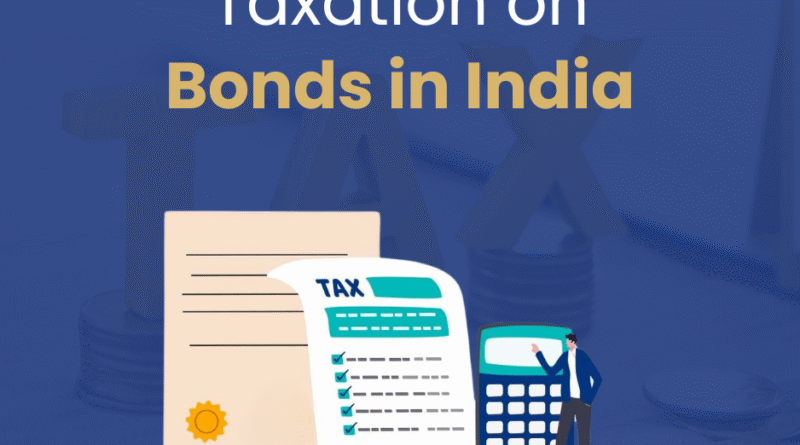Taxation on Bonds in India: Impact on Long-Term Wealth
On the financial front in India, bonds are fast becoming a very strong investment channel. Most investors use bonds as a way of balancing equity exposure, generating fixed income, and lowering beetling volatility in portfolios. When assessing bonds, the tendency is to look at rates or issuers, and tax usually gets ignored. Tax exposure is vital for anyone intending to invest in bonds for wealth creation in the long term.
Bonds in the Investment Portfolio
Bonds represent loans that have been made to governments, public sector institutions, and corporate entities by investors. In return, the issuer offers to pay interest after a certain fixed period and to repay that amount at maturity. Bonds are known to have a stabilizing character, but the real value of the investment will ultimately depend on the tax treatment of the income generated from it. During long periods, tax efficiency can impact significantly wealth accumulation.
Types of Bonds in India and Their Taxation
The Indian bond market hosts several instruments, all with distinct features and different tax implications. The common types of bonds in India are categorized as follows:
Government Bonds– These are issued by the central or state government. Interest earned is fully taxable, but investors consider them mostly for their security.
Corporate Bonds– These qualify interest income on the slab rate of taxation on the net income of the investor. In addition, selling them before maturity would attract capital gains tax.
Tax-Free Bonds– There are bonds by certain government-backed institutions exempted from tax on interest income. A condition attached is that if the bonds are sold in the secondary market before maturity, capital gains are applied.
Convertible Bonds– These can be converted into equity at a subsequent period. Until conversion, interest is taxable. After conversion into equity, the investment would be treated as such and thus capital gains rules for shares apply.
Perpetual Bonds– These bonds are issued by the banks and non-banking financial institutions as well, and they do not have a specified maturity date. Interest earned is taxable, and if sold, capital gains apply.
Interest Income and Tax Implications
Except for tax-free bonds, interest from bonds is typically taxed under that head of income as “Income from Other Sources.” Thus, each taxpayer, depending on his or her slab, will have different taxation rates on the income. An investor in a higher bracket might find out through after-tax returns from taxable bonds that it may be significantly lower than the coupon rate.
This can be exemplified by taking a corporate bond paying an 8-percent interest for one year. For an investor falling under the range of the 30-percent slab, post-tax it becomes 5.6 percent as per calculation, which nicely highlights how taxation is as important as the coupon rate in planning one’s investment in bonds.
Capital Gains Tax on Bonds
In addition to the interest gain, the investor must also consider the applicable capital gains tax during selling a bond before maturity.
Short-Term Capital Gains (STCG): If held for less than 36 months, gains are taxed at the slab rate of the investor.
Long-Term Capital Gains (LTCG): If the hold period is equal to or greater than 36 months, it will be taxed at either 10 percent with no indexation or 20 percent with indexation, depending on the bond.
These tenets are driving longer-period holdings
Taxation and Long-Term Wealth Creation
Taxations are essential in wealth creation through bonds. Investors preferring tax-free bonds may rather get reduced coupon rates but will reap tax-exempt income potential, which is more beneficial to them if they are found in the higher brackets. Oppositely, corporate or perpetual bonds feature greater nominal yields but lower post-tax returns.
The effect of compounding tax-efficient income can over decades amount to a significant difference in the resultant wealth. For example, an investor who relies solely on taxable interest will accumulate less wealth than he who balances tax-free instruments with taxable ones.
Strategic Game Plan for Investors
Investors should:
Research coupon rates and tax implications before spending.
Hold the various types of bonds in a diversified way for a diverse and tax-efficient portfolio.
Horizon of investment should match with that of the period the investor plans to hold the bond that would be the most efficient in terms of capital gains taxation.
Regularly revisit bond investments as applicable laws and personal income slabs change.
In this regard, bonds may very well complement a well-diversified and tax-efficient portfolio.
Summary
Taxation decides how bonds will affect returns over the long term. Since there are different taxes on different types of bonds in India, it is essential to understand these differences to invest in bonds. These bonds will allow one to make money over time and be a potentially important unit of financial stability.


